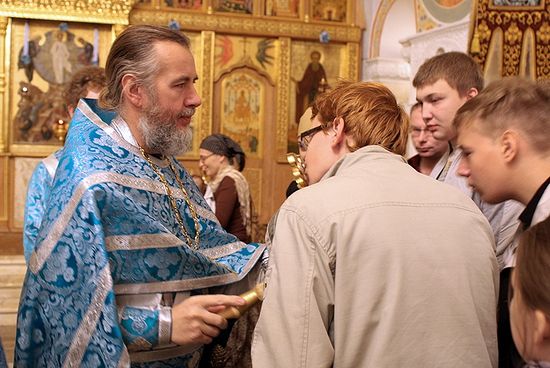We are now in the fourth week of Great Lent, and many of us feel some cooling compared to the first days due to the hustle and bustle of everyday life. How can we keep a prayerful and focused spirit through the whole of Lent? How can we keep from losing the spiritual fruits acquired in the first days?
***
Fr. Valery Dukhanin:
We are all very, very weak people, and to expect constant asceticism from ourselves is impossible. It can even lead to serious malfunctions and breakdowns, when someone already draws in their mind how to pass the whole Lenten arena without a single fall, meticulously tries, and then at some point slips up and from that falls into despair, because he thinks he has spoiled all of Lent for himself. Passions often appear where we don’t expect them. But God allows those very falls due to our arrogance, that we would be humbled and from henceforth rely not on our own works, but on God. The Providence of God is also in this, and is sometimes incomprehensible to us.
Many passions escalate during Lent, internal sicknesses come to light, and the cankers of our souls of which we were unaware. It’s necessary for us to see how much we are corroded by sin, in order to clearly understand what to overcome within ourselves, and what we still have to work on. Here is the main principle: if you have gone astray and fallen, then rise up, shake off the dust and move on, having gained spiritual experience.
It’s important to remember this. If at sowing a grain falls into shallow ground, it will quickly sprout and grow, but will also quickly die, because there isn’t enough depth. It’s the same with us. When we burn with some ascetic feats, we want to quickly obtain fruit, zealously rush forward, and then, having met the brunt of daily labors, we are depleted. Fervor and zeal are not necessary for spiritual fruits, but depth of spirituality.
To preserve a spiritual attitude, it’s worth remembering that we embark upon asceticism not for delight, not for comfort of heart and the delight of our spiritual senses, but to cultivate and weed our souls of that which has been planted within. And in this sense it is important to muster patience, to labor, to rise up from a fall, and all the same to maintain a prayer rule, even if we have no such desire within.
Imagine a man, who, coming to his country home, rejoiced exceedingly, felt inspiration from the appearance of nature, joyfully did some work in the garden beds, and then gave up everything because the constant work became tedious and boring to him. Such a garden will be quickly overgrown with weeds, such that you cannot go among the thickets.
In the spiritual life you cannot live only by your first inspirations. Otherwise you won’t make it along the whole spiritual path, but your soul will become covered over by the prickly thicket of the passions. We need patience, even when it seems that the heart is silent and there’s no sense in starting any new work. Prayer is not valuable only when it comes from an inspired and warm heart, but also when you feel an inner dryness, exhaustion, and emptiness, and you pray all the same. You may be weakened, and your thoughts wander, but God receives prayer when you, against all odds, try to return your mind to the holy words of the prayers and not abandon the prayer rule. Schema-Abbot Savva of the Pskov Caves Monastery once said, “Do not give up prayer when the enemy overtakes you unconsciously; he who compels himself to pray through dryness of soul is higher than he who prays with tears.” Spiritual success comes then when you notice a slackening within yourself, and in spite of all indisposition, you move ahead anyways.
And again, sometimes it’s important to look at yourself as from the outside: What is happening with me, what am I doing right now, how is my standing before God? The Patericon tells us about one ascetical elder, who, wherever he found himself, often checked his mind with the question, “Where are we?” If his mind was dwelling in prayer and glorification of God, then he would say, “Good, good.” If his mind was engaged by something foreign, then he would upbraid himself: “Return immediately to your work.” And again he would say to himself, “The hour of my departure is near, but I see nothing good in myself.” It helped him preserve himself in constant vigilance. Let us try to remember that we are forever in God’s sight, that what is happening within our souls does not go unnoticed and that the Lord is always ready to help us with His all-powerful help.
***
Archpriest Igor Ryabko:
Prayerful and repentant focus is a high note, and you can only sustain it in solitude, and even then not for everyone, and not always. As for how to achieve the maximum “overall” in the daily hustle and bustle I would recommend the following.
Our life is a spiritual building, and each passing day is another brick laid. The clay of this brick consists of three ingredients: our thoughts, feelings, and desires. Combined with one another, they give rise to intentions and turn those intentions to actions.
It’s important to be able to keep control over these three basic components, that our thoughts do not disperse, our desires do not arouse the “desiring” and “irascible” parts of the soul, and our feelings would be found in the plane of a prayerful spirit and repentant memory. It’s very difficult. To do it we have to remove everything that will distract our minds from inner attentiveness from our field of vision and hearing, or, at least deprive ourselves of all forms of entertainment and idleness.
Our mind is a millstone, working without stopping. Therefore, if we don’t plant wheat there, the demons will certainly plant chaff. Give your mind food for thought. For this we must read something to feed the mind with good feelings and ponder what we have read. If it becomes a habit, then congratulations on your worthy endeavor!
***
Archpriest Andrei Nikolaidi:
Probably, so as not to lose fruit, we should absolutely not think about it. After all, if we approach Lent and prayer for the sake of gifts of grace, for the sake of the purification of our body, for the sake of peace in our family, we lose the main thing—Christ. Any good work, done not for the sake of the Lord, but for the sake of any other purpose, cannot be regarded as a virtue. Moreover, if we see some kind of “gifts” in ourselves after some definite period of fasting, we must quickly run to our spiritual father, because it’s the clearest sign of prelest. In fact, precise fulfillment of the commandments of God gives rise to a feeling of one’s own infirmity in the human soul. If when fasting we begin to peer into ourselves—what virtue have I acquired, what spiritual gifts have been opened to me today—we fling ourselves into the abyss of egoism, which is sure to entangle us in a web of other sins. Lent is a time when we must stop scrutinizing our beloved selves and try to see the pain, suffering, sorrows, and hardships of those who, by the will of God, are around us; because simply by peering into their eyes we will see God.
***
Archpriest Igor Fomin:
Our prayer life is the basic foundation of our communion with God. We distinguish two states in prayer: the prayer rule, and prayer itself. Prayer is communion with God, conversation with God, in which prayer is not a monologue but a dialogue. The Lord always answers our prayer. How can we preserve this state?
Our tender Mother-Church attunes us in the first week of Great Lent to a prayerful feat through the Canon of St. Andrew of Crete. It seems to me that it’s precisely attentive entry into this state that is as if the main principle of preserving the whole of this prayer. The fact is that prayer is the private state of a man, and, when we begin to pray, we should enclose ourselves within the confines of our heart, as it says in Holy Scripture, and elevate our prayer to our Heavenly Father.
We should employ every means on this path to not be distracted by the external world. That is, we must die to the external world for some time. There are certain stimuli that cause spiritual impulses incongruent with prayer. These stimuli must be eliminated from a man’s life. What kinds of stimuli? Various kinds. The evil one places in each man’s way whatever he will stumble upon. For one man it’s social networks, for another it’s his reaction to his neighbors, and to another it’s food, and so on. Every man should generally look and know himself very well—what estranges him from God and what draws him nearer to God, and to use only those means which enable him to burn for Christ.
I believe that prayer should be expressed in unceasingly walking before the face of God. The feeling of God’s presence in our lives should be constant. This is the most important effect of prayer. The prayer rule, which we fulfill—morning and evening prayers, prayers throughout the day—is the tuning fork which should configure us. In order to pray correctly we must remember how other people have done it. The tender Church gives us this example. To preserve prayer, we must be able to pray together with others and to be prepared for struggles.
Fruit must undergo several phases: appearing, maturation, being eaten. It appears at the beginning of Lent, and then we must do all to protect it from frost and other external forces, that it would ripen. But the eating of the fruit is at the end of Great Lent—it is the reward that we will experience in the bright Resurrection of Christ, that exultation of soul inherent in every Christian. And how do you determine if you have proper exultation or not?! If you want to share and you do share this jubilation with others, then it is a correct exultation of soul. If you do not want to lose this exultation and you conceal it from others, then it’s the wrong fruit, a wrong spiritual condition.
***
Archpriest Andrei Ovchinnikov:
Preserving a prayerful spirit largely depends on our desires. The main thing is to want it. The success of any work depends on the state of our will, and it is different for everyone. The entire Christian spiritual life calls us to continually work on ourselves. Such work tempers and strengthens our will. In the Gospels it is called the dedication and leavening of our inner state.
The labor of prayer is not given to anyone easily. Here a rule of the holy fathers is active: “Give blood and receive spirit.” Prayer is only given to those who pray, and only the practice of prayer determines the success of our deeds. Great Lent is a special time, and for me, unique. Many feel the special grace-filled help of God with spiritual labors and feats. We must engage in the prayer-repentance rhythm from the first days, and better yet—hours, of Great Lent. “A firm beginning will certainly be useful for us when we later grow slack,” teaches St. John of the Ladder. Experience shows a sad picture—a real, genuine, serious spiritual life is possible for us only in Great Lent. The rest of the time the degree of exertion seriously falls, and our zeal for the spiritual life is much weaker. Therefore, let’s gather all our spiritual and bodily strength for a worthy Lent. Lent, according to St. Ignatius Brianchanninov, is the foundation of Christian virtues, and their summit is prayer. We must seriously tune ourselves to prayer. The services of Great Lent are very helpful in the work of prayer, as, according to St. Ignatius Brianchanninov, they’re good for practicing the unhurried and attentive reading of the Jesus Prayer. It’s important to remove yourself as far as possible from entertainments and idleness, and to curtail contact with people who don’t demand our sympathy and help. It is a special labor to leave social networks and sitting online. It’s important to take the Holy Scriptures in hand—it’s necessary to read the Biblical books of Genesis, the Prophet Isaiah, the Proverbs of Solomon and the Book Job in Lent. We read the Psalter daily. We reduce our stomachs and our appetites with discernment. The normal faster should lose weight by Pascha.
Such labors will create the right prayerful attitude. Limitation in bodily food is compensated by spiritual food. Most importantly—no relaxation and self-pity. We read the morning and evening prayer rules without omission, we add Kathismas, the Canon of Repentance, and prostrations. We listen to spiritual hymns and homilies from our favorite priests in the car. In a word, a serious attitude to Lent and the work of prayer. I believe there will necessarily be results. The proof is in our peaceful inner spirit, not judging others and a realistic view of our sins.
We all want that our Lent would bring fruit and good results… Firstly, to God, then our neighbors, and finally, for ourselves. The time of Lent is a time of repentant labors, abstinence, and prayer. Within Lent we acquire much good, and renounce much bad… A sincere desire to live in the spirit of the Gospels and never depart from Christ appears in many of us during Lent.
Long-awaited peace arrives in our souls… Sin is seen as vile and hated… We see others in another light. All of this means that we have begun to receive something good for our souls from Lent. This is the good fruit of Lent. The understanding comes that the main thing is not the number of prostrations, but strictness in abstinence, and not the amount of spiritual literature read. Then what? That of which the Gospel on Forgiveness Sunday speaks—the gathering of treasure, the path towards which begins with the forgiveness of the offenses and sins of our neighbors and continues through the feat of the entirety of Lent.
That which we gather during Lent is very useful for us throughout the entire year. But for it to be enough for a year, we must be very careful with what we have accumulated. Wherefore we receiving a kingdom which cannot be moved, let us have grace (Heb. 12:28), the apostle Paul teaches us; and in another place he adds, Look diligently lest any man fail of the grace of God (Heb. 12:15). How many works do we do to acquire grace and all good things? And how easily and quickly it can all be lost… The experienced Christian is known not so much in the acquisition of the grace of God, as in retaining it. How often we feel the presence of grace in our heart in a church of God. But we exit “into the world,” onto the street, and we begin to look around indiscriminately, we reach for our cell phone, at home we turn on the television, we say bad words, and our hearts, so recently so peaceful and calm, lose grace, and our souls experience melancholy and despair.
Why does this happen? It’s obvious that someone robs it from us; someone doesn’t like our serene state. In the holy fathers this process of the loss of grace is described in great detail. The devil especially attacks those who have something valuable—that which unites us with God, and which will never be his. Therefore, the first means of protection from spiritual thieves and bandits is an attentive and sober life. Watch and pray, that ye enter not into temptation (Mt. 26:41) the Holy Gospel teaches us. Then we need to add labor upon labor. To swim against the current, we must constantly work the oars; to burn a fire we must constantly add firewood to it. In the spiritual life there can be no vacations, weekends, or lunch breaks. The devil does not eat or sleep, and does not rest, but as a roaring lion, walketh about, seeking whom he may devour (1 Pt. 5:8).
And finally, let us peacefully and humbly approach our failures and errors. We also need negative experiences—they can teach us a lot. The main thing is to draw the right conclusions from everything that happens and not despair. Pascha is still a ways away, but time rushes headlong forward. I propose to think ahead of time about how we will live after the end of Lent. Will we see our prayerful attitude, will we continue our reading and contemplation of Holy Scripture, will we lead an attentive life as concerns our soul? Or will Lent pass, and all come to naught?
I want to wish everyone that Lent would become for them a faithful friend that is always with us and comes to our aid in difficult moments, that the fruits of Lent and our collected treasure would be unconditionally stored for us in Heaven, and that here it would gladden and comfort us in hard times of sorrow and testing of our faith.









